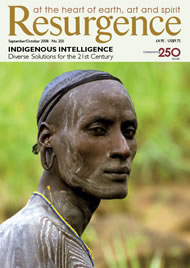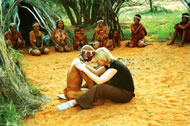“I FEEL ‘OUT of touch’ at the moment” … “Are you in touch with her still?” These phrases that we use daily, point to the inherent importance of touch as a form of communication. However, if you asked most people what the primary form of communication is, they would probably answer ‘language’.
Beata Aleksandrowicz would disagree. “Touch”, she says, is “the mother of all senses”. Aleksandrowicz is a massage therapist with a mission – to demonstrate the importance of touch to our isolated modern society. “Touch is very often associated with violence, sexual abuse or massage parlours,” she explains, “It has all-but vanished from our everyday lives.” “We live in a time of dualism and separation,” she continues, “But when we exchange touch we reach the core of our existence and communicate beyond language.”
Aleksandrowicz prefers to talk about ‘intentional touch’, which describes a decision to connect with the body on a much deeper level than the muscular one. The language to describe what she is doing is not yet formed – it is what it is. Like music, or love, you have to experience it. Even then, you might not be able to put it into words.
To demonstrate the power of touch, and its ability to communicate without language, Aleksandrowicz has been spending time with an extended family of Kalahari Bushmen on the border between Namibia and Botswana.
The Bushmen are traditional hunter-gatherer nomads. However, their way of life is slowly being eroded with land being fenced off, bought by private companies and used for farms or mining. These free people have found themselves pushed further and further from their food supply and into the arid grassland of the Kalahari.
Many of them now live in reservations, called National State Parks, which offers them water resources. However, they are not allowed to hunt in the reservations. They share the land with two tribes: the Hereros and Tswana, which is a source of a deep and serious conflict.
On her first visit, Aleksandrowicz asked if she could touch the Bushmen. They gave her permission. From that moment, she spent many hours and days with the Bushmen and their families in silence – communicating through touch. “I believe that touch is a very profound way of reaching another human being,” she says, “Touch is greater than words, for often we just use these words to lose the silence that surrounds us. But when we touch, barriers begin to come down and true communication begins.”
On her next trip, silence had no place, even from the very beginning. Words, laughter, songs and hugs heralded her return. For the power of touch had established its credence. This time the Bushmen asked her for massages – to help them sleep, to help remove worries, to soothe tired muscles. But most of all so that they could relieve the stress and grief caused by the loss of their nomadic way of life.
Aleksandrowicz is planning to visit countries such as Mongolia, Ethiopia, Ecuador and Okinawa Island, to meet their inhabitants through touch. She believes that the project will be inspirational and educational for the Western public, who, she believes are dangerously depriving themselves of touch. “When touch is not present, there is no sense of belonging,” she says, “We cannot be community orientated, therefore the level of responsibility for the world outside us – on the micro level of the family or on the global, international level is very low and sometimes even totally vanished.”
LOOKING AT PHOTOGRAPHS of Aleksandrowicz with the Bush people, you do a double take. A European woman healing an African tribesman? Surely it must be the other way around – for two reasons. Firstly, when it comes to indigenous communities, Westerners have historically been the takers – taking photographs, measurements, information, healing, traditional knowledge. It is heartening to see the role reversed. Secondly, most Westerners seem to carry with them a deep insecurity about their ‘divorce from Nature’. We chastise ourselves for being industrialised, unnatural, stressed – and look towards native peoples as the original shamans and healers. So looking at the photographs again, at this extraordinary role reversal, is inspiring.
It is also poignant because it shows how much, in fact, we share and how close we all are despite our differences. Above all, it shows the power of touch: a deep communication that is more powerful than words. •
For more information about the Bushman project, and to view a short film, please visit www.thekalaharibushmensupport.com







